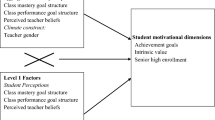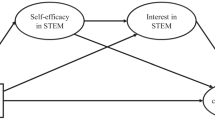Abstract
Although the gender gap has dramatically narrowed in recent decades, women remain underrepresented in many science, technology, engineering, and mathematics (STEM) fields. This study examined social and personal factors in relation to adolescent girls’ motivation in STEM (math/science) versus non-STEM (English) subjects. An ethnically diverse sample of 579 girls ages 13–18 years (M = 15) in the U.S. completed questionnaires measuring their academic achievement, ability beliefs, values, and experiences. Social and personal factors were hypothesized to predict motivation (expectancy-value) differently in math/science (M/S) and English. Social factors included perceived M/S and English support from parents and peers. Personal factors included facets of gender identity (felt conformity pressure, gender typicality, gender-role contentedness), gender-related attitudes, and exposure to feminism. In addition, grades, age, parents’ education, and ethnicity were controlled. Girls’ M/S motivation was positively associated with mother M/S support, peer M/S support, gender-egalitarian beliefs, and exposure to feminism; it was negatively related to peer English support. Girls’ English motivation was positively associated with peer English support as well as felt pressure from parents; it was negatively related to peer M/S support and felt peer pressure. The findings suggest that social and personal factors may influence girls’ motivation in domain-specific ways.
Similar content being viewed by others
References
Andre, T., Whigham, M., Hendrickson, A., & Chambers, S. (1999). Competency beliefs, positive affect, and gender stereotypes of elementary students and their parents about science versus other school subjects. Journal of Research in Science Teaching, 36, 719–747. doi:10.1002/(SICI)1098-2736(199908)36:6<719:AID-TEA8>3.0.CO;2-R.
Bandura, A. (1997). Self-efficacy: The exercise of control. New York: Freeman.
Barber, B. L., Stone, M. R., Hunt, J. E., & Eccles, J. S. (2005). Benefits of activity participation: The roles of identity affirmation and peer group norm sharing. In J. L. Mahoney, R. W. Larson, & J. S. Eccles (Eds.), Organized activities as contexts of development: Extracurricular activities, after-school and community programs (pp. 185–210). Mahwah, NJ: Erlbaum.
Baumeister, R. F., & Leary, M. R. (1995). The need to belong: Desire for interpersonal attachments as a fundamental human motivation. Psychological Bulletin, 117, 497–529. doi:10.1037/0033-2909.117.3.497.
Bell, L. A. (1989). Something’s wrong here and it’s not me: Challenging the dilemmas that block girls’ success. Journal for the Education of the Gifted, 12, 118–130.
Bigler, R. S. (2006, April). Viva la difference or vanquish la difference? In Presentation at the second biennial gender development research conference, San Francisco.
Bigler, R. S., & Liben, L. S. (2007). Developmental intergroup theory: Explaining and reducing children’s social stereotyping and prejudice. Current Directions in Psychological Science, 16, 162–166. doi:10.1111/j.1467-8721.2007.00496.x.
Bouchey, H. A., & Harter, S. (2005). Reflected appraisals, academic self-perceptions, and math/science performance during early adolescence. Journal of Educational Psychology, 97, 673–686. doi:10.1037/0022-0663.97.4.673.
Brown, C. S., & Bigler, R. S. (2004). Children’s perceptions of gender discrimination. Developmental Psychology, 40, 714–726. doi:10.1037/0012-1649.40.5.714.
Brown, C. S., & Leaper, C. (2010). Latina and European American girls’ experiences with academic sexism and their self-concepts in mathematics and science during adolescence. Sex Roles, 63, 860–870. doi:10.1007/s11199-010-9856-5.
Bussey, K., & Bandura, A. (1999). Social cognitive theory of gender development and differentiation. Psychological Review, 106, 676–713. doi:10.1037/0033-295X.106.4.676.
Chen, X., Ender, P. B., Mitchell, M., & Wells, C. (2003). Regression with STATA. Retrieved from: http://www.ats.ucla.edu/stat/stata/webbooks/reg.
Coleman, J., & Hendry, L. B. (1999). The Nature of adolescence. London: Routledge.
Crosnoe, R., Riegle-Crumb, C., Field, S., Frank, K., & Muller, C. (2008). Peer group contexts of girls’ and boys’ academic experiences. Child Development, 79, 139–155. doi:10.1111/j.1467-8624.2007.01116.x.
Davis-Kean, P. E. (2005). The influence of parent education and family income on child achievement: The indirect role of parental expectations and the home environment. Journal of Family Psychology, 19, 294–304. doi:10.1037/0893-3200.19.2.294.
Eccles, J. S., & Wigfield, A. (2002). Motivational beliefs, values, and goals. Annual Review of Psychology, 53, 109–132. doi:10.1146/annurev.psych.53.100901.135153.
Eccles, J. S., Wigfield, A., Harold, R. D., & Blumenfeld, P. (1993). Ontogeny of children’s self-perceptions and subjective task values across activity domains during the early elementary school years. Child Development, 64, 830–847. doi:10.2307/1131221.
Egan, S. K., & Perry, D. G. (2001). Gender identity: A multidimensional analysis with implications for psychosocial adjustment. Developmental Psychology, 37, 451–463. doi:10.1037/0012-1649.37.4.451.
Elliot, A. J., & Devine, P. G. (1994). On the motivational nature of cognitive dissonance: Dissonance as psychological discomfort. Journal of Personality and Social Psychology, 67, 382–394. doi:10.1037/0022-3514.67.3.382.
Else-Quest, N. M., Hyde, J. S., & Linn, M. C. (2010). Cross-national patterns of gender differences in mathematics: A meta-analysis. Psychological Bulletin, 136, 103–127. doi:10.1037/a0018053.
Ex, C. T. G. M., & Janssens, J. M. A. M. (1998). Maternal influences on daughters’ gender role attitudes. Sex Roles, 38, 171–186. doi:10.1023/A:1018776931419.
Frome, P., & Eccles, J. S. (1998). Parents’ influence on children’s achievement-related perceptions. Journal of Personality and Social Psychology, 74, 435–452. doi:10.1037/0022-3514.74.2.435.
Galambos, N. L., Petersen, A. C., Richards, M., & Gitelson, I. B. (1985). The attitudes toward women scale for adolescents (AWSA): A study of reliability and validity. Sex Roles, 13, 343–356. doi:10.1007/BF00288090.
Guay, F., Marsh, H. W., & Boivin, M. (2003). Academic self-concept and academic achievement: Developmental perspectives on their causal ordering. Journal of Educational Psychology, 95, 124–136. doi:10.1037/0022-0663.95.1.124.
Guimond, S., & Roussel, L. (2001). Bragging about one’s school grades: Gender stereotyping and students’ perception of their abilities in science, mathematics, and language. Social Psychology of Education, 4, 275–293. doi:10.1023/A:1011332704215.
Halpern, D. F., Benbow, C. P., Geary, D. C., Gur, R. C., Hyde, J. S., & Gernsbacher, M. A. (2007). The science of sex differences in science and mathematics. Psychological Science in the Public Interest, 8, 1–51. doi:10.1111/j.1529-1006.2007.00032.x.
Harter, S. (2003). The development of self-representations during childhood and adolescence. In M. R. Leary & J. P. Tangney (Eds.), Handbook of self and identity (pp. 610–642). New York: Guilford.
Hill, N. E., Castellino, D. R., Lansford, J. E., Nowlin, P., Dodge, K. A., Bates, J. E., et al. (2004). Parent academic involvement as related to school behavior, achievement, and aspirations: Demographic variations across adolescence. Child Development, 75, 1491–1509. doi:10.1111/j.1467-8624.2004.00753.x.
Jacobs, J. E., Lanza, S., Osgood, D. W., Eccles, J. S., & Wigfield, A. (2002). Changes in children’s self-competence and values: Gender and domain differences across grades one through twelve. Child Development, 73, 509–527. doi:10.1111/1467-8624.00421.
Katz, P. A., & Ksansnak, K. R. (1994). Developmental aspects of gender role flexibility and traditionality in middle childhood and adolescence. Developmental Psychology, 30, 272–282. doi:10.1037/0012-1649.30.2.272.
Kuncel, N. R., Crede, M., & Thomas, L. L. (2005). The validity of self-reported grade point averages, class ranks, and test scores: A meta-analysis and review of the literature. Review of Educational Research, 75, 63–82. doi:10.3102/00346543075001063.
Kurtz-Costes, B., Rowley, S. J., Harris-Britt, A., & Woods, T. A. (2008). Gender stereotypes about mathematics and science and self-perceptions of ability in late childhood and early adolescence. Merrill-Palmer Quarterly, 54, 386–409. doi:10.1353/mpq.0.0001.
Leaper, C. (2002). Parenting girls and boys. In M. H. Bornstein (Ed.), Handbook of parenting: Vol. 1: Children and parenting (2nd ed., pp. 189–225). Mahwah, NJ, US: Erlbaum.
Leaper, C., & Brown, C. S. (2008). Perceived experiences with sexism among adolescent girls. Child Development, 79, 685–704. doi:10.1111/j.1467-8624.2008.01151.x.
Leaper, C., & Van, S. R. (2008). Masculinity ideology, covert sexism, and perceived gender typicality in relations to young men’s academic motivation and choices in college. Psychology of Men and Masculinity, 9, 139–153. doi:10.1037/1524-9220.9.3.139.
Liben, L. S., & Bigler, R. S. (2002). The developmental course of gender differentiation: Conceptualizing, measuring, and evaluating constructs and pathways. Monographs of the Society for Research in Child Development, 63(2), vii-147. doi:10.1111/1540-5834.t01-1-00187.
Marsh, H. W., & Yeung, A. S. (1998). Longitudinal structural equation models of academic self-concept and achievement: Gender differences in the development of math and English constructs. American Educational Research Journal, 35, 705–738. doi:10.2307/1163464.
National Science Foundation. (2008). Bachelor’s degrees, by sex and field: 1998–2007. Retrieved August 24, 2010 from http://www.nsf.gov/statistics/wmpd/degrees.cfm#bachelor.
PayScale. (2011). 2010–11 college salary report. Retrieved May 30, 2011 from http://www.payscale.com/best-colleges/degrees.asp.
Prentice, D. A., & Carranza, E. (2002). What women should be, shouldn’t be, are allowed to be, and don’t have to be: The contents of prescriptive gender stereotypes. Psychology of Women Quarterly, 26, 269–281. doi:10.1111/1471-6402.t01-1-00066.
Raffaelli, M., & Ontai, L. L. (2004). Gender socialization in Latino/a families: Results from two retrospective studies. Sex Roles, 50, 287–299. doi:10.1177/0743558403260002.
Riegle-Crumb, C., Farkas, G., & Muller, C. (2006). The role of gender and friendship in advanced course taking. Sociology of Education, 79, 1017–1045. doi:10.1177/003804070607900302.
Robnett, R. D., & Leaper, C. (2011, April). Peer support, academic values, and adolescents’ interest in STEM careers. In R. S. Bigler (Chair), Finding meaningful work: Values, gender, and the pursuit of academic and occupational interests. Symposium conducted at the biennial meeting of the Society for Research in Child Development, Montreal, Quebec.
Simpkins, S. D., Davis-Kean, P. E., & Eccles, J. S. (2006). Math and science motivation: A longitudinal examination of the links between choices and beliefs. Developmental Psychology, 42, 70–83. doi:10.1037/0012-1649.42.1.70.
Smetana, J. G., Metzger, A., Gettman, D. C., & Campione-Barr, N. (2006). Disclosure and secrecy in adolescent–parent relationships. Child Development, 77, 201–217. doi:10.1037/0012-1649.42.1.70.
Stake, J. E. (2006). The critical mediating role of social encouragement for science motivation and confidence among high school girls and boys. Journal of Applied Social Psychology, 36, 1017–1045.
Stake, J. E., & Nickens, S. D. (2005). Adolescent girls’ and boys’ science peer relationships and perceptions of the possible self as scientist. Sex Roles, 52, 1–11. doi:10.1007/s11199-005-1189-4.
Stangor, C., & Sechrist, G. B. (1998). Conceptualizing the determinants of academic choice and task performance across social groups. In J. K. Swin & J. Stangor (Eds.), Prejudice: The target’s perspective (pp. 105–124). San Diego: Academic Press.
Steinberg, L., & Silverberg, S. (1986). The vicissitudes of autonomy in early adolescence. Child Development, 57, 841–851. doi:10.1037/0012-1649.26.4.658.
Tobin, D. D., Menon, M., Menon, M., Spatta, B. C., Hodges, E. V. E., & Perry, D. G. (2010). The intrapsychics of gender: A model of self-socialization. Psychological Review, 117, 601–622. doi:10.1037/a0018936.
Valenzuela, A. (1993). Liberal gender role attitudes and academic achievement among Mexican-origin adolescents in two Houston inner-city Catholic schools. Hispanic Journal of Behavioral Sciences, 15, 310–323. doi:10.1177/07399863930153002.
Weisgram, E. S., & Bigler, R. S. (2007). Effects of learning about gender discrimination on adolescent girls’ attitudes toward and interest in science. Psychology of Women Quarterly, 31, 262–269. doi:10.1111/j.1471-6402.2007.00369.x.
Wigfield, A., & Eccles, J. S. (2002). Expectancy-value theory of achievement motivation. Contemporary Educational Psychology. Special Issue: Motivation and the Educational Process, 25, 68–81. doi:10.1016/B978-012750053-9/50006-1.
Wigfield, A., Eccles, J. S., MacIver, D., Reuman, D. A., & Midgley, C. (1991). Transitions during early adolescence: Changes in children’s domain-specific self-perceptions and general self-esteem across the transition to junior high school. Developmental Psychology, 27, 552–565. doi:10.1037/0012-1649.27.4.552.
Zakaria, F. (2008). The post-American world. New York: W. W. Norton & Co.
Acknowledgments
The research was supported by grants to the first author from the University of California Santa Cruz Academic Senate and Social Sciences Division, and by a grant to the third author from the University of California Los Angeles Center for the Study of Women. The authors are grateful to the girls in Atlanta, Los Angeles, and Santa Cruz for their participation. Also, the authors thank the following: Melanie Ayres and Carly Friedman for their helpful suggestions during survey construction; Agnieszka Spatzier for data coordination; and Bren Michelle Chasse and Nicole Nunez for data entry. Preliminary findings from this study were presented at the Biennial Meeting of the Society for Research in Child Development in Montreal, April 2011.
Author information
Authors and Affiliations
Corresponding author
Rights and permissions
About this article
Cite this article
Leaper, C., Farkas, T. & Brown, C.S. Adolescent Girls’ Experiences and Gender-Related Beliefs in Relation to Their Motivation in Math/Science and English. J Youth Adolescence 41, 268–282 (2012). https://doi.org/10.1007/s10964-011-9693-z
Received:
Accepted:
Published:
Issue Date:
DOI: https://doi.org/10.1007/s10964-011-9693-z




